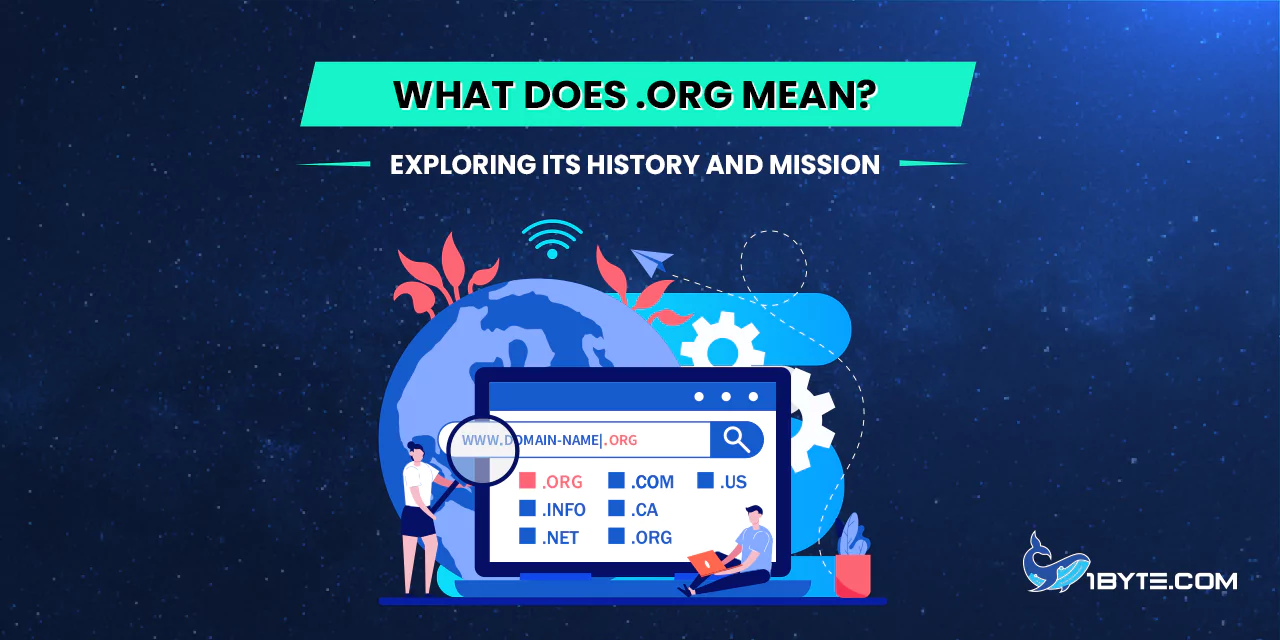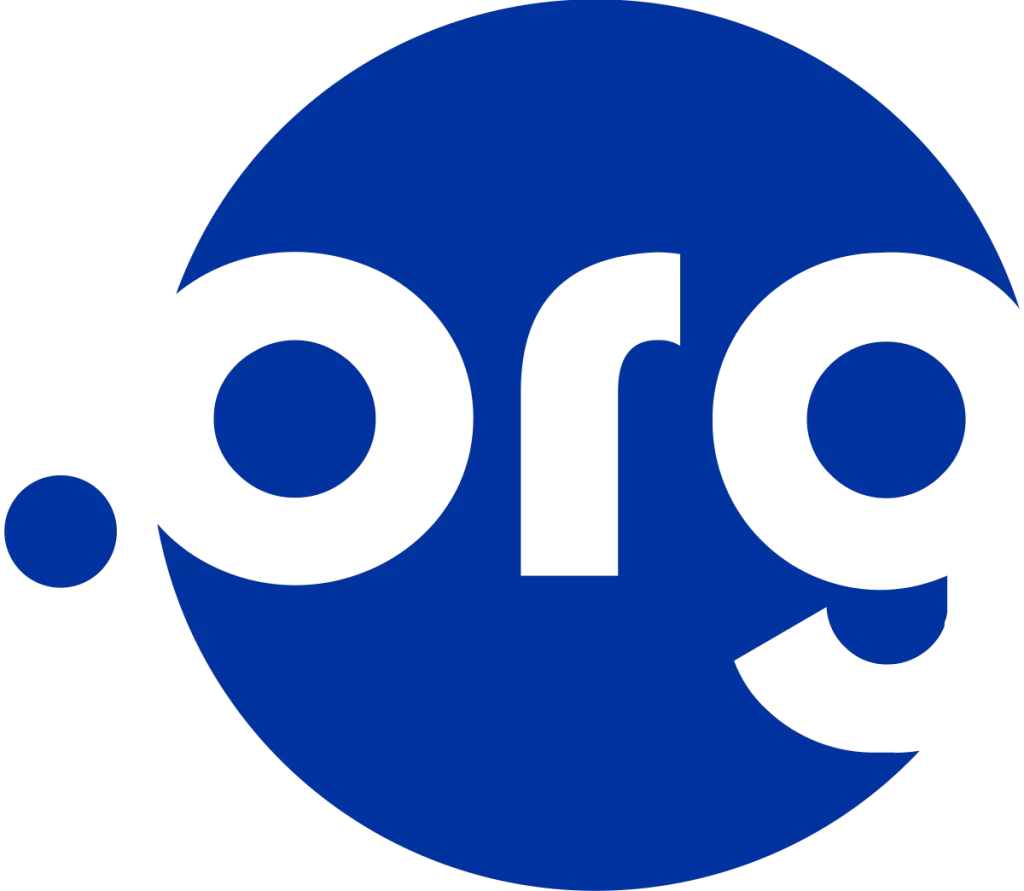What Does .org Mean? Exploring Its History and Mission

Embark on a digital journey with 1Byte, Cambodia’s premier cloud and hosting provider, as we unravel the mystery behind “What Does .org Mean?” In the dynamic realm of the internet, understanding the history and mission of this domain extension is key. Explore the significance of “.org” in the top-level domain list with us, discovering its evolution and the purpose it serves in the ever-expanding online landscape. Join 1Byte in demystifying the story behind “.org,” as we delve into its roots and the impactful role it plays in connecting organizations with a shared mission. Whether you’re a tech enthusiast or a curious netizen, this exploration promises insights into the heart of the digital domain.
Understanding .org
Understanding .org is paramount in navigating the vast online landscape. In this section, we’ll unravel the layers behind “What Does .org Mean?” and explore its history and mission.
Definition and origin of .org
What does .org mean exactly? The “.org” domain extension stands for “organization,” emphasizing a website’s affiliation with non-profit entities, communities, and mission-driven groups.
The origin of .org dates back to the early days of the internet. It was introduced in 1985 as one of the original top-level domains (TLDs) established to categorize websites based on their purpose. The intent behind .org was to designate a space exclusively for organizations that aimed to make a positive impact on society.
Since its inception, .org has evolved into a symbol of trust and credibility. Websites bearing this extension often represent entities focused on social causes, education, and humanitarian efforts. This deliberate categorization assists users in quickly identifying and connecting with organizations aligned with their interests.
Understanding the roots of .org provides a glimpse into its purpose – fostering a digital space where altruism and shared missions thrive. As the exploration continues, the significance of .org becomes clearer, highlighting its crucial role in shaping the online landscape.
Differentiating .org from other extensions
In distinguishing .org from other extensions, the uniqueness of its purpose comes to the forefront. What does .org mean in comparison to other domain extensions? Unlike commercial-focused extensions like .com or network-specific ones like .net, .org stands apart as a dedicated space for organizations driven by a mission rather than profit.

While .com is commonly associated with businesses and commercial entities, and .net often signals a network-related purpose, .org specifically caters to non-profit organizations, communities, and groups with a clear societal or humanitarian objective. This differentiation serves as a beacon for users seeking websites aligned with values and causes.
Choosing .org signals an intent to contribute to a greater good, emphasizing transparency and dedication to a cause. This intentional categorization aids internet users in quickly identifying and supporting organizations that share their values. Understanding this distinction becomes crucial in navigating the online landscape, allowing individuals and entities to express their commitment to positive social impact.
As we delve deeper into differentiating .org from other extensions, the significance of this choice becomes more pronounced, highlighting the role of .org in fostering a digital space dedicated to meaningful and purpose-driven endeavors.
| FURTHER READING: |
| What is .cf Domain: A Closer Look |
| What is .ai Domain: A Closer Look |
| When to Go .com vs .net for Your Online Presence |
| What is the .net Domain? Understanding the Basics |
The Mission Behind .org
What does .org mean in the context of a mission? This section delves into the heart of .org, unraveling its purpose and the positive impact it fosters in the digital sphere. As we explore the mission behind .org, users will gain insights into how this domain extension becomes a catalyst for organizations striving to make a difference.
The original purpose and mission
What does .org mean at its core? In its inception, the mission was clear: to provide a designated digital space for non-profit organizations, communities, and groups dedicated to making a positive difference.
The original purpose of .org, established in 1985, was to create a distinct online identity for entities driven by a mission rather than profit. This deliberate categorization aimed to foster a sense of trust and credibility, ensuring that users could easily identify and support organizations aligned with their values.

As we explore the original mission of .org, it becomes evident that this domain extension serves as a virtual haven for entities with a commitment to societal welfare. Choosing .org signifies a dedication to transparency and a desire to contribute meaningfully to the greater good.
This historical context not only defines the roots of .org but also underscores its ongoing mission. Understanding the original purpose of .org lays the foundation for appreciating its role in shaping a digital landscape where purpose-driven organizations find their place and make a lasting impact.
Evolution of the .org domain over time
Since its establishment as one of the original top-level domains (TLDs) in 1985, the .org domain has undergone substantial changes, reflecting the evolving landscape of the internet.
Initially conceived for non-profit and non-commercial organizations, the .org domain witnessed a significant surge in registrations over the years. From MITRE Corporation‘s pioneering registration in 1985 to reaching ten million registered domains by 2012, .org has consistently held a prominent place in the online domain ecosystem.
The shift in 2019, where the Internet Society planned to sell the Public Interest Registry (PIR) to Ethos Capital, marked a crucial moment in the .org domain’s history. The proposed sale, aimed at over a billion dollars, raised concerns about potential fee hikes and censorship under private equity control. However, ICANN’s intervention in April 2020 blocked the sale, citing the need to protect non-profits relying on the .org domain.
Despite these challenges, the .org domain remains a beacon for organizations dedicated to positive impact. With registrations processed globally through accredited registrars, it continues to be a versatile space open to anyone, fostering inclusivity and diversity in its user base.
Understanding the evolution of the .org domain provides valuable insights into its resilience and adaptability. As we navigate through the changes and challenges, the enduring mission of .org becomes even more pronounced, solidifying its role as a digital sanctuary for purpose-driven entities.
Common uses of .org domain today
The versatility of the .org domain is evident through its widespread adoption across various sectors:
- Non-profit organizations find a digital home in the .org domain, from charitable endeavors to environmental initiatives.
- Open-source software projects proudly utilize .org, underscoring their community-driven and non-commercial ethos.
- Educational institutions and platforms leverage .org to emphasize their commitment to providing public good.
- Religious and civic organizations choose .org to highlight their non-commercial nature, fostering a sense of trust.
- Schools stake their online presence with .org, emphasizing their role as educational institutions dedicated to knowledge dissemination.
- Sports teams embrace .org, showcasing their community-oriented approach and connecting with fans.
- Legal services, particularly those offering pro bono support, opt for .org, signaling a commitment to social responsibility.
- Individuals carve out their online identity with .org, especially those emphasizing non-commercial or community-oriented aspects of their work.
- Even in the commercial realm, .org finds a place, exemplified by well-known instances like craigslist.org, demonstrating the domain’s adaptability.
In exploring the common uses of the .org domain today, it becomes evident that .org transcends traditional boundaries, serving as a digital canvas for entities and individuals driven by a mission or a sense of community.
Why Choose .org?
What does .org mean for those seeking a digital identity? This section explores the distinct advantages and unique features that make .org the preferred choice for a diverse array of entities. As users navigate the digital landscape, understanding why .org stands out becomes paramount.
Advantages and considerations for selecting .org

Exploring the advantages and considerations for selecting .org provides valuable insights for entities seeking a digital foothold. What does .org mean in terms of strategic choices? Let’s delve into the compelling reasons that make .org a preferred domain extension, keeping in mind key considerations for optimal decision-making.
1. Credibility and Trust:
Selecting .org instantly communicates credibility and trustworthiness. Organizations leveraging .org are often associated with noble causes and a commitment to positive impact.
2. Non-Profit Recognition:
For entities focused on non-profit activities, .org serves as a recognized symbol. It distinguishes them within the digital landscape, emphasizing their dedication to societal betterment.
3. Global Recognition:
.org enjoys global recognition as a domain extension aligned with organizations pursuing a mission beyond commercial interests. This international recognition can enhance an entity’s reach and influence.
4. Inclusivity and Diversity:
The open registration policy of .org fosters inclusivity and diversity. Anyone can register a .org domain, promoting a varied online community that goes beyond geographical or organizational boundaries.
5. Community Connection:
For those emphasizing community-oriented initiatives, .org offers a platform that resonates with like-minded individuals. It becomes a digital hub for fostering connections and collaboration.
Meanwhile, there are some considerations regarding the usage of the .org domain:
1. Misuse Concerns:
While .org is intended for non-profit and mission-driven organizations, some commercial entities also use it. Consider the potential for misconceptions and ensure that the chosen .org domain aligns with the entity’s true nature.
2. Availability and Competition:
Due to the popularity of .org, desirable domain names may face competition. It’s essential to check availability and plan accordingly to secure the most fitting domain.
3. Evolving Landscape:
The .org domain has witnessed changes, including attempted sales and policy adjustments. Stay informed about any shifts that might impact the domain’s stability or reputation.
Navigating the selection process with these advantages and considerations in mind allows entities to make informed choices aligning with their values and objectives. As the exploration of .org continues, the strategic significance of this domain extension becomes increasingly evident in fostering purpose-driven online presences.
Examples of well-known .org websites
Discover the impact of .org through prominent examples showcasing its diverse applications. What does .org mean in the digital realm? Let’s explore some well-known .org websites that exemplify the domain’s versatility and commitment to positive change.
1. Girls Who Code (girlswhocode.org):
Girls Who Code empowers young females with computer science skills, bridging the gender gap in the tech industry. The .org extension reinforces its non-profit mission, signaling a commitment to inclusivity.
2. Equal Opportunity Community Initiative (EOCI) (eocinitiative.org):
Based in Toronto, EOCI focuses on providing vulnerable children equal opportunities. The .org domain emphasizes its non-commercial, community-centric approach to supporting children in need.
3. Craigslist (craigslist.org):
Craigslist.org, a renowned classified advertisements platform, is a testament to the .org domain’s flexibility. Despite its commercial aspects, the .org extension indicates a commitment to community service and engagement.
Wikipedia.org, the world’s free online encyclopedia, relies on the .org domain. This choice reflects its non-profit, collaborative nature, as volunteers worldwide contribute to a shared knowledge resource.
5. Internet Archive (archive.org):
Archive.org, a non-profit library preserving free content, epitomizes the .org domain’s role in promoting open access. Hosting millions of free resources, it aligns with the mission of making information accessible to all.
These examples illuminate the diverse applications of .org, transcending commercial boundaries to embody missions centered around education, community service, and global impact. Understanding these well-known .org websites provides valuable insights into the domain’s enduring significance.
Conclusion
The exploration of “What Does .org Mean?” has unraveled a tapestry of purpose and impact within the digital realm. Understanding the history and mission behind .org reveals its pivotal role in fostering a digital space for organizations, initiatives, and individuals committed to positive change. The journey has showcased the versatility of .org, from empowering girls in technology to preserving global knowledge through collaborative platforms.
As entities like Girls Who Code and Wikipedia leverage the .org domain to signify their non-profit, community-centric missions, it becomes clear that .org is more than just a domain extension. It’s a symbol of dedication to inclusivity, transparency, and the greater good.
For those considering their digital identity, the advantages and considerations discussed shed light on why .org stands out as a compelling choice. From credibility and trust to global recognition, the .org domain continues to be a beacon for purpose-driven entities seeking to make a meaningful impact.
As 1Byte, the leading cloud and hosting provider in Cambodia, navigates the digital landscape, the significance of .org becomes evident. It’s not merely a string of characters; it’s a commitment to a mission, a signal of trust, and an invitation to be part of a community dedicated to positive change.
